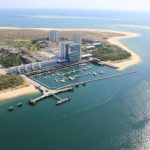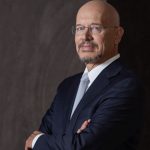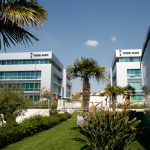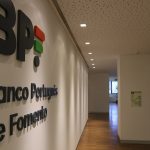AmCham Innovation Talks: Dynasty: – BIAL – Four generations in the pursuit of pharmaceutical excellence
In 2013 when António Portela decided it was time to join the family firm BIAL to become the fourth generation involved in the family company, which this year celebrated its 100th anniversary on April 19, Bial was a small player in the pharmaceutical industry – compared to the multinationals operating in Portugal – with a €80 million turnover. BIAL CEO António Portela talked about his hopes for the family business, which started in 1929 from humble beginnings over a chemist’s shop in Porto, at a breakfast organised by the American Chamber of Commerce in Portugal (AmCham).
Text and Photos: Chris Graeme
Although big in Portugal, BIAL’s international sales were modest with two commercially successful licences to produce the antibiotic Clavamox and the topical anti-inflammatory Reumon Gel. BIAL was being run at the time by his father Luís Portela whose mission had been to employ innovation to transform the company into both the largest player in the Portuguese pharma sector, but also invest in a long-term strategy to integrate BIAL into the international drug company elite by developing and producing its own medicines.
Prior to joining the company, António had cut his teeth not in his father’s company but elsewhere, in London, where he worked for the multinational Roche as a market analyst and product manager for Hepatitis C medicines.
By 2009, after 15 years of research and around €350 million of investment, the Trofa-based company launched its first medicine developed from scratch onto the global market – the anti epilepsy drug Zebnix.
António’s father Luís handed over the reins of the company to his son who became BIAL’s new CEO.
António Portela is an interesting character. Not many people may know it, but before he embarked on a career following in his father’s footsteps, he was a top-level competition swimmer for FC Porto, used to swimming 70 Km a week, was the absolute national champion in the 100 metres freestyle, and only by a cat’s whisker missed being selected for the Olympic Games in Atlanta in 1996.
A world leader in Parkinson’s medication
In 2016 BIAL launched its second patented drug, the anti-Parkinson’s medicine Ongentys after 11 years of research and an investment of €280 million.
Today BIAL is a leader in technological innovation and research investment in Portuguese pharma, with 20% of its turnover, and which helped transform the company’s profile and consolidate its internationalisation.
During the Covid-19 pandemic, BIAL set up a subsidiary in the United States, Bial Biotech, near Boston from an existing company from which it purchased the world rights to research programmes into Parkinson’s.
The goal was to extend its pipeline of projects under development in its specialised area with an estimated €100 million investment.
Also in the United Staes, BIAL signed an exclusive 10-year licensing agreement with Sumitomo Pharma to sell a medicine for Parkinson’s in Europe. BIAL has high hopes that this drug will be part of its top 3 products by the end of the decade.
While in the US and Europe BIAL is focused on neurological diseases, in Portugal and Spain its diversified portfolio also covers cardio-metabolic, respiratory and musculoskeletal diseases, women’s health and maternity care.
In the emerging markets of Africa and Latin America its products cover neurological diseases, maternity care, infectious diseases and respiratory illnesses.
The company has been in hands of the same family since it was founded in 1924 by Álvaro Portela – apparently a colourful character brimming with self confidence who liked to drive around Porto in a Cadillac – who ran BIAL for 40 years. Since 2013, BIAL has been run by his great-grandson António Portela, while the former banker Antonio Horta Osório is the company’s chairman. In 2023 António Portela was considered the 23rd most influential business leader in Portugal by the business daily Negócios.
The business had humble beginnings in 1924 when Álvaro Portela decided to build a laboratory over the pharmacy where he worked. The son of a grocer, he became a self-made man who opened shop at 6.30am each morning to collect the prescriptions from patients who travelled from the suburbs of Porto to the pharmacy. The industrial laboratory got its name from the ‘Al’ from Álvaro and ‘Al’ from his boss Senhor Almeida, hence BIAL – Two-‘AL’s.
Today, BIAL’s main markets are the US, Spain, Germany and Italy, although the company exports to over 50 countries with oversea sales generating three-quarters of its €340 million turnover posted for 2023.
BIAL enjoyed its really first commercial success in 1929, ironically the year of the Great Crash and the start of the Great Depression, by launching Benzo-Diacol, a cough mixture that is still on sale today under the brand name of Diacol.
Although António never knew his grandfather António Emílio Portela, who became president of BIAL in 1962 and only held the helm at the company for 10 years, he modernised the packaging of the medicines produced under licence and further industrialised production and manufacturing.
But the main transformation of the company has been over the past 30 years under his father Luís Portela, based on innovation and research, and development and internationalisation, beginning at the close of the 1980s and start of the 1990s.
“This effort from my father, who trained to be a doctor and researcher but had no experience managing companies, was because he realised that if BIAL didn’t innovate and create value from its products the company’s future would be in doubt and even fail as many companies have in the sector over the past three decades”, said António Portela.
As explained, this strategy was a success. However, this year, its 100th in business, BIAL will lose its patent in Europe for Zebnix and next year in the US, with an estimated loss of €40 million. Nevertheless, the pharma closed 2023 up 6% in terms of growth and is currently exploring opportunities to enter the Chinese market.
Addressing business leaders at AmCham, António Portela said, “We will continued to modernise and develop the company as we have been doing in recent years, researching new medicines. “Developing and researching new drugs is a slow and complicated process that takes years but we hope to be able to launch one or two new drugs in the neuroscience and rare illnesses areas this decade”.










